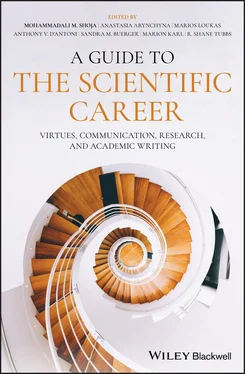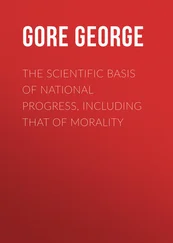1 Cover
2 List of Contributors
3 Preface
4 Section I: Successful Career 1 Defining and Re‐Defining Success 1.1 Introduction 1.2 Success Mindsets 1.3 Prerequisites Are Internal Factors Required to Become Successful 1.4 Methods Are Conscious Actions One Should Take to Pave the Road to Success 1.5 Enhancers or Catalysts Are External Factors that Enhance One's Chance of Success 1.6 Inhibitors Are Internal or External Factors that Diminish One's Chance of Success Reference 2 Qualities of Research Scientists: Personality and Leadership Attributes of Research Team Members 2.1 Leadership 2.2 Personality and Interpersonal Relationships 2.3 Continuous Self‐Assessment 2.4 Tips for Developing a Leader‐Quality Scientist References 3 Building a Personal Vision Statement 3.1 Personal Vision Statement and Portfolio Overview 3.2 Getting Started 3.3 Vision Statement in Action 3.4 Rules to Guide Vision Statement Development 3.5 Conclusions References Further Reading 4 Creativity and Novel Hypotheses 4.1 Creativity and Science 4.2 What Are Mind Maps? 4.3 Mind Maps and Novel Hypotheses References 5 Confidence and Its Impact on Your Aspiring Career 5.1 Introduction 5.2 Sources of Confidence 5.3 Influence of Confidence on Your Career 5.4 Confidence Spectrum 5.5 Dunning‐Kruger Effect 5.6 Importance of Feedback 5.7 Overcoming Confidence Issues References 6 Career Satisfaction and Its Determinants 6.1 Introduction 6.2 Determinants of Career Satisfaction 6.3 Career Satisfaction in Medicine 6.4 Research and the Physician‐Scientist 6.5 Career Satisfaction and Productivity 6.6 Conclusions References 7 Spiritual Dimensions of Biomedical Research 7.1 Introduction 7.2 Virtues in Research 7.3 A Christian‐Platonic Background of Virtues 7.4 Skills Versus Wisdom 7.5 A Crystallizing Example Acknowledgment References 8 Publishing in Academic Medicine: Does It Translate into a Successful Career? 8.1 Introduction 8.2 Dissemination of Knowledge and Impacting Patient Care 8.3 Becoming a Recognized Expert 8.4 Academic Promotion 8.5 Professional Standing 8.6 Personal Satisfaction 8.7 Editorial Benefits 8.8 Professional Contacts 8.9 Summary: Does Publishing Scholarly Articles Translate into a Successful Scientific Career? Reference 9 Assessing a Researcher's Scientific Productivity and Scholarly Impact 9.1 Introduction 9.2 The h ‐Index 9.3 Criticisms of the h ‐Index 9.4 Modifications and Extensions of the h ‐Index 9.5 A General Criticism on the Use of Metrics 9.6 Citation Data Sources 9.7 Discussion References Further Reading
5 Section II: Communication 10 Manners in Academics 10.1 General Aspects 10.2 Manners in Academic Writing and Publishing 10.3 Conclusions 11 Emotional Intelligence: Its Place in Your Professional and Academic Careers 11.1 Background 11.2 The Importance of EQ in Academia and on the Job 11.3 Major Aspects of Emotional Intelligence 11.4 Developing EQ References 12 Communication Skills 12.1 Introduction 12.2 Effective Communication 12.3 Communication in the Scientific and Medical Community References 13 Learning Charisma 13.1 Introduction 13.2 What Is Charisma? 13.3 Learning How to Be Charismatic 13.4 Improving Your Charisma 13.5 Conclusions References 14 Essence of Collaborative Research: Leadership, Engaging Others, and Cooperativeness 14.1 Introduction 14.2 Why Collaborate? 14.3 Challenges to Collaborative Research 14.4 Ethical Considerations 14.5 How to Make Collaborations Work 14.6 Conclusions References 15 Personal Branding for Physicians and Researchers 15.1 Introduction 15.2 Personal Branding and Authenticity 15.3 Your Brand Plan: Defining Your Positioning 15.4 Creating Your Brand Elements 15.5 Strategizing Your Tactics 15.6 Executing Your Brand Plan 15.7 Conclusion Further Reading 16 Dealing with Manipulative People 16.1 Tips for Avoiding the Traps of a Manipulator 16.2 Neurosis versus Pathology: A Continuum 16.3 Aggressive Personalities 16.4 Tactics Used by the Covert‐Aggressor 16.5 Tips for Setting the Terms of Engagement Reference
6 Section III: Research Ethics 17 Honesty and Truth in Academic Research and Writing 17.1 Introduction 17.2 Truth 17.3 Honesty 17.4 Dishonesty 17.5 Spectrum of Fraud 17.6 Learning from the Past 17.7 The Pattern of Fraud 17.8 Conflicts of Interest 17.9 Lessons for the Future Acknowledgment References 18 Writing and Scientific Misconduct: Ethical and Legal Aspects 18.1 Introduction 18.2 Ethical Aspects 18.3 Legal Aspects References 19 Plagiarism and How to Avoid It 19.1 Introduction 19.2 Definition of the Plagiarism Problem 19.3 Academic Integrity and Plagiarism 19.4 Intellectual Dishonesty and Plagiarism in Science 19.5 Detection of Plagiarism: Electronic Tools 19.6 Prevention of Plagiarism: A Better Remedy 19.7 Penalties for Plagiarism 19.8 Conclusions References Further Reading 20 Conflicts of Interest: A Simple Explanation 20.1 Introduction 20.2 What Is a Conflict of Interest? 20.3 Why Does Avoidance or Full Disclosure of Conflicts‐of‐Interest Matter? Reference 21 Gender Differences in Medical Research Productivity 21.1 Introduction 21.2 Gender Differences in Scholarly Productivity 21.3 Gender Differences in Research Funding 21.4 Issues Potentially Facilitating Gender Differences in Research 21.5 Conclusion References Further Reading
7 Section IV: Research Regulations 22 Institutional Review Boards: General Regulations, Institutional Obligations, and Personal Responsibility 22.1 IRB Background 22.2 Regulatory Framework 22.3 IRB Process 22.4 Investigator Responsibilities in Conducting Human Subjects Research 22.5 IRB Application 22.6 Related Research Committees 22.7 Publishing and the IRB 22.8 Selected Frequently Asked Questions (FAQs) 23 International Research with Human Subjects 23.1 General Overview 23.2 Regulatory and Legal Frameworks and IRB Oversight 23.3 Ethical Framework Further Reading
8 Section V: Research Grants and Proposals 24 Grants and Funding Sources 24.1 Introduction 24.2 Grant Life Cycle 24.3 Types of Funding Organizations 24.4 Types of Agreements 24.5 Types of Grant Applications 24.6 Federal Grant Mechanisms 24.7 Career Timeline and NIH Mechanisms 24.8 Funding Cycle 24.9 Searchable Databases 24.10 Time Commitment and Infrastructure and Support 24.11 Post Award Further Reading 25 Essentials of Grant Writing and Proposal Development 25.1 The Research Plan 25.2 Budget and Budget Justification 25.3 Grant Documents and Grant Formatting 25.4 Conclusions Further Reading
9 Section VI: Research Principles and Methods 26 Clinical Research Methods and Designs 26.1 Introduction 26.2 Structure of Clinical Studies 26.3 Sample Size, Study Subjects, and Variables 26.4 Functional Aspects of Clinical Studies 26.5 Epilogue References 27 Retrospective Analysis from a Chart Review: A Step‐by‐Step Guide 27.1 Stepwise Approach to Retrospective Studies References 28 Designing, Planning, and Conducting Clinical Trials 28.1 Introduction 28.2 Design of Controlled Clinical Trials 28.3 Project Management and Planning for Clinical Trial 28.4 Conduct of Clinical Trials 28.5 Conclusions References 29 Animal Models in Science and Research 29.1 Overview of Using Animals in Science 29.2 Evolved Complex Systems 29.3 Trans‐Species Modeling Theory 29.4 Conclusion References Further Reading 30 How to Identify a Timely and Relevant Topic for a Literature Review 30.1 Introduction 30.2 Identifying a Relevant and Timely Topic 30.3 Narrowing the Topic 30.4 Literature Reviews and Clinical Practice 30.5 Conclusion References 31 The Structure and Conduct of a Narrative Literature Review 31.1 Introduction 31.2 Review Team 31.3 Topic and Audience 31.4 Literature Search 31.5 Taking Notes 31.6 Type of Review 31.7 Balance 31.8 Criticism, Consistency, Objectivity 31.9 Structure 31.10 Feedback and Revision 31.11 Dissemination Acknowledgments References 32 A Guideline for Conducting Systematic Reviews 32.1 Introduction 32.2 Why Systematic Reviews? 32.3 A Guideline for Conducting Systematic Reviews 32.4 Weaknesses of SRs 32.5 Summary and Conclusions References 33 Clinical Management Guidelines 33.1 Introduction 33.2 How Is a Clinical Guideline Created? 33.3 Benefits and Limitations of Clinical Management Guidelines 33.4 Medicolegal Implications of Clinical Guidelines 33.5 Conclusions References 34 Why Is the History of Medicine and Biology Important? 34.1 The Value of Knowing Our History 34.2 An Illustration: Rudolf Virchow 34.3 Conclusions References 35 Historical Articles: A Methodology Guide 35.1 General Guidelines 35.2 Types of Historical Articles References
Читать дальше












